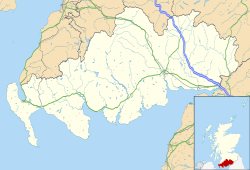Haugh of Urr
| Haugh of Urr | |
|---|---|
 | |
Location within Dumfries and Galloway | |
| OS grid reference | NX8066 |
| Council area | |
| Lieutenancy area | |
| Country | Scotland |
| Sovereign state | United Kingdom |
| Post town | Castle Douglas |
| Postcode district | DG7 |
| Dialling code | 01556 |
| Police | Scotland |
| Fire | Scottish |
| Ambulance | Scottish |
| UK Parliament | |
| Scottish Parliament | |
Haugh of Urr (/hɒx ... ɜːr/), is a village in the historical county of Kirkcudbrightshire in Dumfries and Galloway, Scotland. It is approximately 4 miles (6 kilometres) NNW of Dalbeattie, 3 mi (5 km) NE of Castle Douglas, 12+1⁄2 mi (20 km) west of Dumfries and 12+1⁄2 mi (20 km) east of Kirkcudbright.
Description
[edit]The village is situated beside the River Urr. Scots haugh (also hauch, haw, halch) means 'river-meadow', i.e. a level piece of ground beside a stream, from Old English halh, healh 'corner, nook'.[1] Urr is from Cumbric or 'border, boundary, limit'.[2]
It has one public house, the Laurie Arms (which incorporates a part-time post office), one church (Church of Scotland), a village hall, a Scout hut, and a small village green. The village no longer has any shops. It used to have two shops, one of which included a petrol filling station, while the other included a full-time post office, which reduced to part-time in later years. The last shop closed in 2009. Hardgate is a nearby hamlet up the hill and the boundaries are indistinct. Agriculture and tourism are the mainstays of the local economy. The village is known to locals as "the Haugh". The Urrbrae, South Australia, a suburb of Adelaide, was named after the village.
River Urr
[edit]The River Urr is noted for salmon fishing. The river, also known as Urr Water originates at Loch Urr and flows for 35 mi (56 km) southwards past Corsock, Glenlair, Auchendolly, Bridge of Urr, Haugh of Urr, and close to Dalbeattie, via Palnackie to the Solway Firth at Rough Firth.
Motte of Urr
[edit]

The Motte of Urr, is the site of a motte-and-bailey castle. Today this medieval earthwork near the Haugh of Urr is said to be the most extensive bailey earthwork in Scotland. It lies beside the River Urr to the north west of Dalbeattie. It dates from the 12th century, and covers an area of about 2 ha (5 acres). In the present day, there are no excavations or walls. It is associated with Buittle Castle, dated to about 1230, which was destroyed early in the 14th century and belonged to Devorgilla and her husband John I de Balliol (founder of Balliol College, at Oxford University). Together they bore the future king John of Scotland.
See also
[edit]References
[edit]- ^ "Haugh". DSL: Dictionaries of the Scots Language / Dictionars o the Scots Leid. Retrieved 24 March 2015.
- ^ James, Alan G. (2014). The Brittonic Language in the Old North: A Guide to the Place-Name Evidence (PDF). Vol. 2: Guide to the Elements. p. 299. Archived from the original (PDF) on 11 September 2014.
External links
[edit]- Overview of the village, at Scottish-Places.info
- Urr Parish Church
- Parish information, at GenUKI.org
- Vale of Urr, at GlenLair.org
- Previously unpublished records for the parish of Urr, at DonJaggi.net
- River Urr, at GlenLair.org
- Motte of Urr, at ScottishPlaces.info
- Motte of Urr, at TheReformation.info
- Buittle Castle, at RCAHMS.gov.uk (Royal Commission on the Ancient and Historical Monuments of Scotland)
- The village in 2006
- Urr Parish Church in 2006
- Haugh Bridge in 2010


 French
French Deutsch
Deutsch


